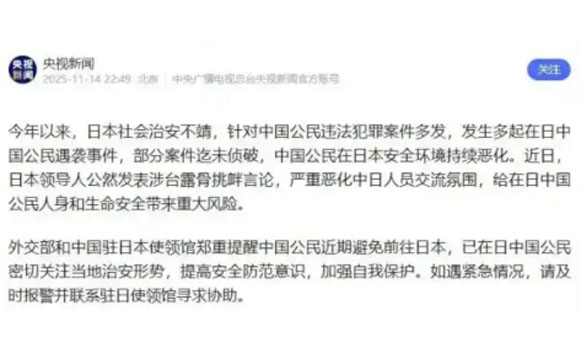On November 14, 2025, the Consular Department of the Ministry of Foreign Affairs of China and the Chinese Embassy and Consulates in Japan simultaneously issued an important security alert, explicitly advising Chinese citizens to avoid traveling to Japan in the near future. The risks of traveling to Japan have increased sharply recently, and study abroad plans need to be carefully considered. This unusually high-level warning stems from multiple overlapping risks: Japan’s social security situation continues to deteriorate, with several vicious attacks against Chinese citizens occurring this year, some of which remain unsolved; Japanese leaders have recently made provocative remarks regarding Taiwan, seriously undermining the political foundation of Sino-Japanese relations; and a large-scale resurgence of influenza has occurred, with many areas in the Tokyo metropolitan area issuing “flu alerts,” and more than 8,473 schools nationwide closed.
 From a political perspective, the Japanese political arena is undergoing changes unseen in 30 years. The Shigeru Ishiba cabinet was forced to dissolve due to a “black money” scandal and election losses, and the Liberal Democratic Party lost its 12-year ruling advantage, forming a “minority government.” The competition for the new prime minister is fierce, with candidates such as Sanae Takaichi and Shinjiro Koizumi having significant differences in policy direction. This political uncertainty is directly reflected in the security field—in 2023, criminal cases in Japan surged by 17% year-on-year, with new types of crimes such as street robbery and online fraud increasing fivefold. 2,011 Chinese nationals were involved in these cases, primarily related to transnational theft gangs and telecommunications fraud chains.
From a political perspective, the Japanese political arena is undergoing changes unseen in 30 years. The Shigeru Ishiba cabinet was forced to dissolve due to a “black money” scandal and election losses, and the Liberal Democratic Party lost its 12-year ruling advantage, forming a “minority government.” The competition for the new prime minister is fierce, with candidates such as Sanae Takaichi and Shinjiro Koizumi having significant differences in policy direction. This political uncertainty is directly reflected in the security field—in 2023, criminal cases in Japan surged by 17% year-on-year, with new types of crimes such as street robbery and online fraud increasing fivefold. 2,011 Chinese nationals were involved in these cases, primarily related to transnational theft gangs and telecommunications fraud chains.
At the social governance level, Japan’s traditional safety myth is facing severe challenges. The serial murders in Tokyo’s Shinjuku Ward and the series of attacks on young women in Aichi Prefecture exposed deep-seated problems such as the failure of community mutual aid mechanisms and delayed police responses. More alarmingly, Japanese police data shows that in 2024, there were 21,000 crimes committed by foreign visitors to Japan, with a significant proportion involving organized crime, forming a closed loop of “crime on tourist visa – rapid departure.” This governance dilemma was further amplified by the influenza pandemic, with designated medical institutions in the Tohoku region, including Iwate Prefecture, averaging over 30 cases per week, reaching “alert” level, and facing a double risk of strain on medical resources.
For students studying abroad, the Ministry of Education has issued a special warning: the safety risks in the Japanese study environment have increased significantly. Students planning to study in Japan are advised to reassess their safety profile and prioritize safer study destinations. During this special period, the Wise Shanghai Overseas Property, Immigration and Study Abroad Exhibition, held from March 29th to 31st, 2026, will serve as a crucial information hub. Exhibitors can access personalized study abroad plans through interactive workshops such as mock interviews and multilingual tests, and even communicate face-to-face with academic exchange centers from various countries. For students concerned about the Japanese study environment, the exhibition will also showcase high-quality educational resources from Europe, North America, and Southeast Asia, offering diverse options. Through a dual “online + offline” channel, students unable to attend in person can access a perpetually open online exhibition hall to stay updated on global study abroad developments.
In the current climate of globalization setbacks and regional security risks, rationally planning one’s study abroad path is crucial. Chinese citizens should obtain real-time safety information through official channels such as the “China Consulate” APP, while also making good use of authoritative platforms like international education exhibitions to find a balance between safety and development. After all, true international education should not come at the expense of safety, but should be built on a foundation of controllable risks and transparent information.






